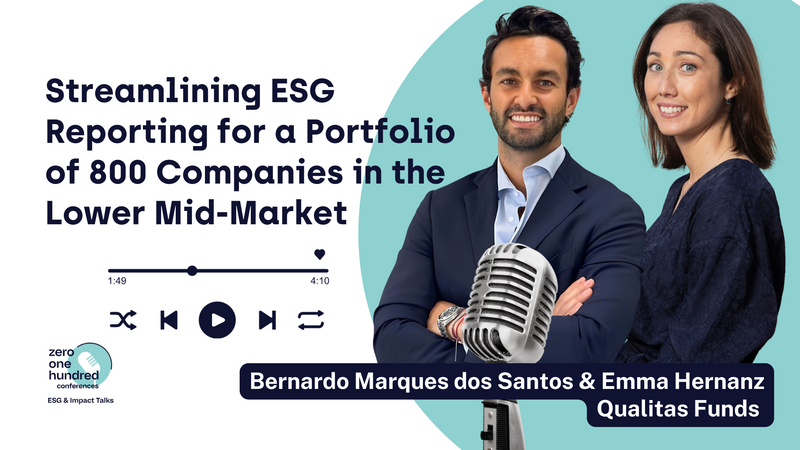This episode of ESG & Impact talks features Bernardo Marques dos Santos, Principal at Qualitas Funds, and Emma Hernanz Turley, Investor Relations Director at Qualitas Funds an investment firm founded in 2015, managing over €1 billion in assets across ten investment vehicles. With its roots in Qualitas Equity Group—known for managing over €10 billion in alternative investments since 2003—Qualitas Funds combines deep expertise with a strong track record in private equity. The firm focuses on identifying the best private equity funds in the international lower mid-market, leveraging its extensive experience to drive success.

Today, our conversation will explore Qualitas’ remarkable journey: transitioning from “avoiding investments with negative impacts” back in 2015 to actively “doing good” through strategic investment decisions in 2024. We’ll dive into the evolution of their ESG approach, key milestones, and the challenges they’ve faced along the way.
Qualitas Funds was founded in 2015 with a purpose. Can you tell us about the firm's initial objectives and its approach to ESG over the years?
Emma: Qualitas Funds was founded with the purpose of investing in private equity with strong returns throughout the economic cycle. Initially, our main focus was generating good returns with low volatility. From the beginning, though, we started our ESG journey step by step.
I joined Qualitas in 2017 and have witnessed most of the ESG evolution. Initially, in 2015, we adopted a “do no harm” approach by setting an exclusion list of sectors we wouldn’t invest in, such as prostitution, coal, tobacco, pornography, and others. This commitment was enforced through side letters with the GPs we worked with.
In 2017, we became signatories of the PRI (Principles for Responsible Investment), which formalized our commitment and introduced annual reporting. By 2018, we developed our first Responsible Investment Policy to integrate ESG considerations across the investment process. In 2020, we aligned with the UN Sustainable Development Goals (SDGs), selecting six firm-level SDGs to promote. Now, we track which SDGs our 800+ portfolio companies contribute to each year.
You mentioned the reporting process began in 2017. Has your ESG reporting evolved since then?
Emma: Absolutely. In 2017, the reporting was centered on the UNPRI’s institutional questionnaire about our firm and ESG processes. By 2021, we started producing our own detailed ESG reports about the portfolio, tracking metrics and progress.
Bernardo: Yes, and we’ve recently published our 2023 report. For context, as a fund of funds, we receive information from underlying funds and portfolio companies with a delay, so we’ll be publishing our 2024 report in 2025 after compiling all the necessary data.
Speaking of data collection, how have you seen ESG reporting improve among GPs?
Bernardo: ESG reporting has definitely gained traction. However, as we’ve moved into smaller fund sizes and emerging managers, challenges have increased. Established funds in their second or third iteration tend to have more mature ESG practices. On the other hand, newer or smaller funds often require significant engagement from us to build their ESG capabilities.
We’ve adopted a hands-on approach, promoting ESG awareness and best practices through initiatives like one-on-one GP discussions and our annual GP retreat, which includes a dedicated ESG section. This peer-sharing model has been quite effective.
Do you invest in impact funds, or is ESG integration primarily a value-add?
Emma: While we don’t have a specific mandate for impact funds, we integrate ESG factors into our investment decision criteria. We’ve backed Article 9 funds and other impact-oriented funds, but always within the same return expectations as traditional private equity funds.
Bernardo, your firm works with a diverse LP base. How do you align their ESG expectations with your strategy?
Bernardo: Our LP base is predominantly family offices and high-net-worth individuals, so ESG isn’t always a primary focus for them. However, we’ve chosen to go beyond their demands. Becoming an Article 8 fund, for example, was our decision—it wasn’t required by our LPs. We’re convinced that ESG is the future and are committed to leading in this space.
That proactive approach is inspiring, especially given your focus on SMEs, which play a crucial role in the economy.
Emma: SMEs are indeed the backbone of the European economy, accounting for 60% of its activity. They also present significant challenges in ESG reporting due to limited resources. Our strategy prioritizes simple, actionable metrics to track progress year over year.
What insights have you gained from your annual ESG reports?
Emma: We’ve observed steady improvement in ESG practices among GPs and portfolio companies. While comprehensive metrics like carbon footprint remain challenging, we focus on tracking progress through targeted questionnaires and engagement. This creates awareness and motivates GPs to develop systems for gathering ESG data.

